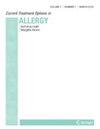Triggers of Anaphylaxis in Mastocytosis Patients: Evidence of the Current Drug-Avoidance Recommendation
IF 1.7
Q3 ALLERGY
引用次数: 0
Abstract
Opinion statement Mastocytosis is associated with a high risk of anaphylaxis, in part due to drug hypersensitivity reactions (DHR). Drugs associated with mast cell activation include nonsteroidal anti-inflammatory drugs (NSAIDs), drugs used in the perioperative setting, including general anesthetics, neuromuscular blocking agents (NMBAs) and opiates/opioids, radiocontrast media (RCM), vaccines, and antibiotics such as quinolones and vancomycin. To protect patients against DHR and anaphylaxis, general avoidance of potential drug triggers is common practice, which often deprives patients of important drugs at times of need and limits their options. We aimed to critically review current evidence on the indications to avoid drugs in children and adults with mastocytosis. Recent data shows that general avoidance of drugs with potential mast cell activation action is not indicated in all patients with mastocytosis, but guidelines are lacking. Drugs tolerated before and after the onset of mastocytosis should not be avoided and a personalized approach is recommended to address drugs inducing mast cell activation. Pre-medication (RCM, local and general anesthetics, vaccines), use of safer alternatives (opioids, NBMAs, NSAIDs in selected cases), and drug challenges (NSAIDs in most cases) are recommended to increase the safety of patients with mastocytosis when introduced to new drugs.肥大细胞增多症患者过敏反应的诱因:当前药物避免建议的证据
肥大细胞增多症与过敏反应的高风险相关,部分原因是药物超敏反应(DHR)。与肥大细胞活化相关的药物包括非甾体类抗炎药(NSAIDs)、围手术期使用的药物,包括全麻药、神经肌肉阻滞剂(NMBAs)和阿片类药物、造影剂(RCM)、疫苗和抗生素,如喹诺酮类药物和万古霉素。为了保护患者免受DHR和过敏反应的影响,一般做法是避免潜在的药物触发因素,这往往使患者在需要时无法获得重要药物,并限制了他们的选择。我们的目的是对肥大细胞增多症的儿童和成人避免用药的适应症的现有证据进行严格审查。最近的数据显示,并非所有肥大细胞增多症患者都应普遍避免使用具有潜在肥大细胞活化作用的药物,但缺乏相关指南。不应避免肥大细胞增多症发病前后耐受的药物,建议采用个性化的方法来解决诱导肥大细胞活化的药物。建议用药前(RCM,局部和全身麻醉剂,疫苗),使用更安全的替代品(阿片类药物,nbma,部分病例中的非甾体抗炎药)和药物挑战(大多数情况下为非甾体抗炎药),以增加肥大细胞增多症患者在引入新药时的安全性。
本文章由计算机程序翻译,如有差异,请以英文原文为准。
求助全文
约1分钟内获得全文
求助全文
来源期刊

Current Treatment Options in Allergy
Medicine-Medicine (miscellaneous)
CiteScore
2.50
自引率
0.00%
发文量
25
期刊介绍:
Current Treatment Options in Allergy will focus on the latest advances in the treatment of allergic disorders. Designed for physicians, this journal offers expert reviews on the management of skin allergies, venom allergies, rhinitis, asthma, food allergies, drug allergies, atopic dermatitis, allergy prevention, and anaphylaxis.Articles cover a range of established and emerging treatment options. We accomplish this by having experts present the latest research, assess the efficacy of available treatment options, and discuss special considerations. We ensure that the journal content includes current, emerging research and suggest articles of special interest.
 求助内容:
求助内容: 应助结果提醒方式:
应助结果提醒方式:


